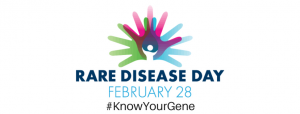Sofia Sees Hope Donates $65K to Help Ensure Free Genetic Testing for Inherited Retinal Disease Patients
Ledyard, CT (February 6, 2018) — Sofia Sees Hope, an organization dedicated to finding treatments and cures for blindness caused by inherited retinal diseases (IRDs), is helping to ensure that patients have access to critical genetic testing through its financial support of a Foundation Fighting Blindness program.
In December 2017, SSH donated $65,000 to FFB’s free genetic testing program, which gives qualified  individuals access to free genetic testing and counseling. It was the organization’s second donation to the program, having provided $15,000 to support a test run of the program in January 2017. Supporting free genetic testing is in line with SSH’s 2018 Rare Disease Day campaign, #KnowYourGene, to promote the importance of genetic testing for those with rare inherited retinal disease.
individuals access to free genetic testing and counseling. It was the organization’s second donation to the program, having provided $15,000 to support a test run of the program in January 2017. Supporting free genetic testing is in line with SSH’s 2018 Rare Disease Day campaign, #KnowYourGene, to promote the importance of genetic testing for those with rare inherited retinal disease.
Dr. Brian Mansfield, FFB’s deputy research officer who manages FFB’s patient registry, My Retina Tracker (MRT) and the genetic testing program, said that SSH’s initial $15,000 donation and other funding led to testing approximately 600 samples in 2017. With the increase in funding, that number can grow exponentially.
Sofia Sees Hope was able to make this latest donation because of its successful fundraising in 2017, primarily through its signature gala event, Dinner in the Dark, as well as individual contributions to the organization throughout the year.
“Last year, we were excited to to support the test program and we couldn’t be more pleased with the outcome,” said SSH co-founder and Board of Directors chair Laura Manfre. “This year, thanks to the tremendous support of our donors, we were able to more than quadruple our contribution as program expands, enabling many more individuals with rare IRDs to receive free testing and genetic counseling.”
With inherited retinal diseases, genetic testing is needed to confirm a clinical diagnosis. With some IRDs, including Leber congenital amaurosis (LCA), myriad genes can cause the disease. Pinpointing the specific gene helps patients find the best and most appropriate treatments and clinical trials for possible cures. Additionally, some forms of LCA can include other health issues — such as kidney function — which are critical to uncover early.
Obtaining a genetic diagnosis for a rare IRD is complex, and this program managed by FFB makes testing and counseling accessible to those with a qualified clinical diagnosis. In addition to being free, families do not have to travel distances to special medical facilities or genetic counselors to take advantage of this specialized testing. The panel itself tests a broad spectrum of 181 genes across IRDs, including LCA, retinitis pigmentosa, Stargardt disease, Usher syndrome and more.
The FFB testing program expansion comes on the heels of the U.S. Food and Drug Administration’s Dec. 19, 2017 approval of LUXTURNA™, the first gene therapy for a genetic disease in the United States. LUXTURNA™ restores sight in those with the RPE65 gene mutation, and underscores the importance for the patient community to undergo genetic testing.
“We now have our first treatment on the market for one genetic mutation of LCA, and we anticiPate others will follow,” Manfre said. “To continue to attract researchers and accelerate these treatmentS requires an identified and informed community, and that means making genetic diagnosis accessible. For a long time and still today there are families and medical professionals who don’t know where to go for this specialized testing, or are turned off by barriers of cost and travel. This program eliminates those barriers. It is our job at Sofia Sees Hope to makes sure this program remains accessible not only with our financial contributions but also through our own education and awareness activities.”
SSH was founded after Manfre’s daughter Sofia was clinically diagnosed with Leber congenital amaurosis (LCA) as a young child. The family spent seven years seeking a genetic diagnosis, traveling and undergoing multiple tests before finally receiving results. There are currently 27 genes associated with LCA, and a key focus for SSH in 2018 is to encourage patient families to undergo genetic testing, which has much improved over recent years.
About Sofia Sees Hope
Sofia Sees Hope was founded in 2014 by Laura Manfre and Charles Priebe, whose daughter Sofia has Leber congenital amaurosis (LCA). This rare degenerative genetic condition is characterized by severe vision loss at birth and leads to total blindness.
The mission of Sofia Sees Hope is to transform the lives of those affected by blindness caused by rare inherited retinal disease. The nonprofit organization generates awareness, raises funds for research, and provides outreach, support and education to those affected by LCA and other rare inherited retinal diseases.
For immediate release
CONTACT:
Elissa Bass
Marketing/Communications
elissa@sofiaseeshope.org
